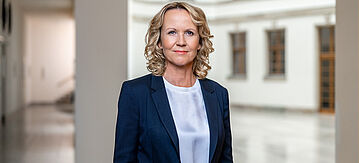– Check against delivery –
Your Royal Highness Prince Albert of Monaco,
Excellencies,
Ladies and gentlemen
The triple planetary crisis of biodiversity loss, pollution and climate change is accelerating in the Arctic. The region is heating up around four times more quickly than the global average, with enormous consequences for the global climate system. Litter from around the world ends up on Arctic beaches and in the Arctic Ocean. Plastic is especially problematic. But diesel soot is also an issue because it speeds up ice melt.
The extreme environments in the Arctic have given rise to highly specialised forms of life. Global heating and pollution threaten these sensitive ecosystems – with irreversible consequences for the global food chain. Intensive research helps us to better understand the processes and developments.
- We know that the thaw of permafrost soils releases huge quantities of greenhouse gases and destroys settlements and infrastructure.
- We know that if the Greenland ice sheet were to melt completely, it would cause a global sea level rise of seven metres.
At the same time, climate change is increasing the environmental pressures on the Arctic.
- It makes raw materials easier to access.
- It makes passage for ships shorter and less difficult.
- Even deep-sea mining seems to no longer be taboo.
All the more reason why this sensitive ecosystem needs our protection.
We cannot simply watch. We must take action together. The knowledge and the possibilities are already available.
Global agreements are an important element. This is why I am very happy that the international community wants to adopt an agreement to combat plastic pollution in the ocean by the end of this year. We made major progress at the last round of negotiations in Ottawa.
And just last year, we concluded the BBNJ Agreement, a key instrument for protecting areas beyond national jurisdiction. Germany is pushing for it to enter into force quickly. We will then finally be able to designate protected areas on the high seas.
Areas beyond national jurisdiction need more protection, not more exploitation. In particular, the deep sea is enormously important for the world climate because it stores carbon. It cannot perform this service if we disturb its ecosystems. This is why I find it very concerning that some are moving forward on deep-sea mining, a potentially very risky new form of use. The first mining application may soon be submitted to the International Seabed Authority, even before any regulations have been agreed. And this, when we still know so little about the ecosystems of the deep sea – about the very sensitive species and habitats there that regenerate extremely slowly. This requires a very careful approach. This is why I want to encourage all countries to join us in calling for a precautionary pause.
Cooperation with Arctic indigenous peoples is key for successful protection of the Arctic. Their livelihoods and way of life are the first to be affected. They have a wealth of experience and expertise that is crucial to conserving the Arctic environment and biodiversity. For this reason, my ministry supports projects that work closely and equitably with Arctic indigenous groups, which I think is very important.
Germany will continue to work with the countries bordering the region for the future of the Arctic. We have been observers in the Arctic Council for a long time.
We must also make faster progress nationally.
- Meeting climate goals.
- Using resources longer.
- Recycling more.
- Preventing waste.
We are working on it. Only a few days ago, I presented the draft of a National Circular Economy Strategy, which will carry us a good way along this path.
The future of the Arctic will decide our future as well. Antoine de Saint-Exupéry once wrote, "As for the future, your task is not to foresee it, but to enable it." He wrote these words about the desert in "The Wisdom of the Sands". But they are true for the icy Arctic as well.

